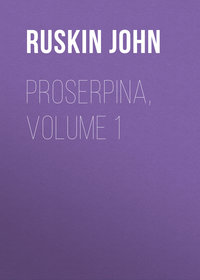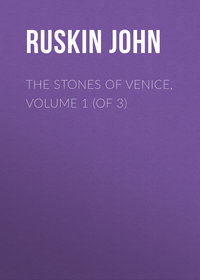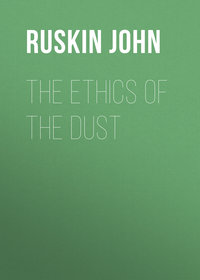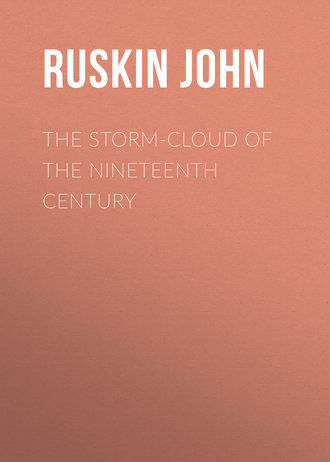
The Storm-Cloud of the Nineteenth Century
When I was last at Avallon, in South France, I went to see 'Faust' played at the little country theater: it was done with scarcely any means of pictorial effect, except a few old curtains, and a blue light or two. But the night on the Brocken was nevertheless extremely appalling to me,—a strange ghastliness being obtained in some of the witch scenes merely by fine management of gesture and drapery; and in the phantom scenes, by the half-palsied, half-furious, faltering or fluttering past of phantoms stumbling as into graves; as if of not only soulless, but senseless, Dead, moving with the very action, the rage, the decrepitude, and the trembling of the plague-wind.
4. Not only tremulous at every moment, it is also intermittent with a rapidity quite unexampled in former weather. There are, indeed, days—and weeks, on which it blows without cessation, and is as inevitable as the Gulf Stream; but also there are days when it is contending with healthy weather, and on such days it will remit for half an hour, and the sun will begin to show itself, and then the wind will come back and cover the whole sky with clouds in ten minutes; and so on, every half-hour, through the whole day; so that it is often impossible to go on with any kind of drawing in color, the light being never for two seconds the same from morning till evening.
5. It degrades, while it intensifies, ordinary storm; but before I read you any description of its efforts in this kind, I must correct an impression which has got abroad through the papers, that I speak as if the plague-wind blew now always, and there were no more any natural weather. On the contrary, the winter of 1878-9 was one of the most healthy and lovely I ever saw ice in;—Coniston lake shone under the calm clear frost in one marble field, as strong as the floor of Milan Cathedral, half a mile across and four miles down; and the first entries in my diary which I read you shall be from the 22d to 26th June, 1876, of perfectly lovely and natural weather.
"Sunday, 25th June, 1876.
Yesterday, an entirely glorious sunset, unmatched in beauty since that at Abbeville,—deep scarlet, and purest rose, on purple gray, in bars; and stationary, plumy, sweeping filaments above in upper sky, like 'using up the brush,' said Joanie; remaining in glory, every moment best, changing from one good into another, (but only in color or light—form steady,) for half an hour full, and the clouds afterwards fading into the gray against amber twilight, stationary in the same form for about two hours, at least. The darkening rose tint remained till half-past ten, the grand time being at nine.
The day had been fine,—exquisite green light on afternoon hills.
Monday, 26th June, 1876.
Yesterday an entirely perfect summer light on the Old Man; Lancaster Bay all clear; Ingleborough and the great Pennine fault as on a map. Divine beauty of western color on thyme and rose,—then twilight of clearest warm amber far into night, of pale amber all night long; hills dark-clear against it.
And so it continued, only growing more intense in blue and sunlight, all day. After breakfast, I came in from the well under strawberry bed, to say I had never seen anything like it, so pure or intense, in Italy; and so it went glowing on, cloudless, with soft north wind, all day.
16th July.
The sunset almost too bright through the blinds for me to read Humboldt at tea by,—finally, new moon like a lime-light, reflected on breeze-struck water; traces, across dark calm, of reflected hills."
These extracts are, I hope, enough to guard you against the absurdity of supposing that it all only means that I am myself soured, or doting, in my old age, and always in an ill humor. Depend upon it, when old men are worth anything, they are better humored than young ones; and have learned to see what good there is, and pleasantness, in the world they are likely so soon to have orders to quit.
Now then—take the following sequences of accurate description of thunderstorm, with plague-wind.
"22d June, 1876.
Thunderstorm; pitch dark, with no blackness,—but deep, high, filthiness of lurid, yet not sublimely lurid, smoke-cloud; dense manufacturing mist; fearful squalls of shivery wind, making Mr. Severn's sail quiver like a man in a fever fit—all about four, afternoon—but only two or three claps of thunder, and feeble, though near, flashes. I never saw such a dirty, weak, foul storm. It cleared suddenly, after raining all afternoon, at half-past eight to nine, into pure, natural weather,—low rain-clouds on quite clear, green, wet hills.
Brantwood, 13th August, 1879.
The most terrific and horrible thunderstorm, this morning, I ever remember. It waked me at six, or a little before—then rolling incessantly, like railway luggage trains, quite ghastly in its mockery of them—the air one loathsome mass of sultry and foul fog, like smoke; scarcely raining at all, but increasing to heavier rollings, with flashes quivering vaguely through all the air, and at last terrific double streams of reddish-violet fire, not forked or zigzag, but rippled rivulets—two at the same instant some twenty to thirty degrees apart, and lasting on the eye at least half a second, with grand artillery-peals following; not rattling crashes, or irregular cracklings, but delivered volleys. It lasted an hour, then passed off, clearing a little, without rain to speak of,—not a glimpse of blue,—and now, half-past seven, seems settling down again into Manchester devil's darkness.
Quarter to eight, morning.—Thunder returned, all the air collapsed into one black fog, the hills invisible, and scarcely visible the opposite shore; heavy rain in short fits, and frequent, though less formidable, flashes, and shorter thunder. While I have written this sentence the cloud has again dissolved itself, like a nasty solution in a bottle, with miraculous and unnatural rapidity, and the hills are in sight again; a double-forked flash—rippled, I mean, like the others—starts into its frightful ladder of light between me and Wetherlam, as I raise my eyes. All black above, a rugged spray cloud on the Eaglet. (The 'Eaglet' is my own name for the bold and elevated crag to the west of the little lake above Coniston mines. It had no name among the country people, and is one of the most conspicuous features of the mountain chain, as seen from Brantwood.)
Half-past eight.—Three times light and three times dark since last I wrote, and the darkness seeming each time as it settles more loathsome, at last stopping my reading in mere blindness. One lurid gleam of white cumulus in upper lead-blue sky, seen for half a minute through the sulphurous chimney-pot vomit of blackguardly cloud beneath, where its rags were thinnest.
Thursday, 22d Feb. 1883.
Yesterday a fearfully dark mist all afternoon, with steady, south plague-wind of the bitterest, nastiest, poisonous blight, and fretful flutter. I could scarcely stay in the wood for the horror of it. To-day, really rather bright blue, and bright semi-cumuli, with the frantic Old Man blowing sheaves of lancets and chisels across the lake—not in strength enough, or whirl enough, to raise it in spray, but tracing every squall's outline in black on the silver gray waves, and whistling meanly, and as if on a flute made of a file.
Sunday, 17th August, 1879.
Raining in foul drizzle, slow and steady; sky pitch-dark, and I just get a little light by sitting in the bow-window; diabolic clouds over everything: and looking over my kitchen garden yesterday, I found it one miserable mass of weeds gone to seed, the roses in the higher garden putrefied into brown sponges, feeling like dead snails; and the half-ripe strawberries all rotten at the stalks."
6. And now I come to the most important sign of the plague-wind and the plague-cloud: that in bringing on their peculiar darkness, they blanch the sun instead of reddening it. And here I must note briefly to you the uselessness of observation by instruments, or machines, instead of eyes. In the first year when I had begun to notice the specialty of the plague-wind, I went of course to the Oxford observatory to consult its registrars. They have their anemometer always on the twirl, and can tell you the force, or at least the pace, of a gale,19 by day or night. But the anemometer can only record for you how often it has been driven round, not at all whether it went round steadily, or went round trembling. And on that point depends the entire question whether it is a plague breeze or a healthy one: and what's the use of telling you whether the wind's strong or not, when it can't tell you whether it's a strong medicine, or a strong poison?
But again—you have your sun-measure, and can tell exactly at any moment how strong, or how weak, or how wanting, the sun is. But the sun-measurer can't tell you whether the rays are stopped by a dense shallow cloud, or a thin deep one. In healthy weather, the sun is hidden behind a cloud, as it is behind a tree; and, when the cloud is past, it comes out again, as bright as before. But in plague-wind, the sun is choked out of the whole heaven, all day long, by a cloud which may be a thousand miles square and five miles deep.
And yet observe: that thin, scraggy, filthy, mangy, miserable cloud, for all the depth of it, can't turn the sun red, as a good, business-like fog does with a hundred feet or so of itself. By the plague-wind every breath of air you draw is polluted, half round the world; in a London fog the air itself is pure, though you choose to mix up dirt with it, and choke yourself with your own nastiness.
Now I'm going to show you a diagram of a sunset in entirely pure weather, above London smoke. I saw it and sketched it from my old post of observation—the top garret of my father's house at Herne Hill. There, when the wind is south, we are outside of the smoke and above it; and this diagram, admirably enlarged from my own drawing by my, now in all things best aide-de-camp, Mr. Collingwood, shows you an old-fashioned sunset—the sort of thing Turner and I used to have to look at,—(nobody else ever would) constantly. Every sunset and every dawn, in fine weather, had something of the sort to show us. This is one of the last pure sunsets I ever saw, about the year 1876,—and the point I want you to note in it is, that the air being pure, the smoke on the horizon, though at last it hides the sun, yet hides it through gold and vermilion. Now, don't go away fancying there's any exaggeration in that study. The prismatic colors, I told you, were simply impossible to paint; these, which are transmitted colors, can indeed be suggested, but no more. The brightest pigment we have would look dim beside the truth.
I should have liked to have blotted down for you a bit of plague-cloud to put beside this; but Heaven knows, you can see enough of it now-a-days without any trouble of mine; and if you want, in a hurry, to see what the sun looks like through it, you've only to throw a bad half-crown into a basin of soap and water.
Blanched Sun,—blighted grass,—blinded man.—If, in conclusion, you ask me for any conceivable cause or meaning of these things—I can tell you none, according to your modern beliefs; but I can tell you what meaning it would have borne to the men of old time. Remember, for the last twenty years, England, and all foreign nations, either tempting her, or following her, have blasphemed20 the name of God deliberately and openly; and have done iniquity by proclamation, every man doing as much injustice to his brother as it is in his power to do. Of states in such moral gloom every seer of old predicted the physical gloom, saying, "The light shall be darkened in the heavens thereof, and the stars shall withdraw their shining." All Greek, all Christian, all Jewish prophecy insists on the same truth through a thousand myths; but of all the chief, to former thought, was the fable of the Jewish warrior and prophet, for whom the sun hasted not to go down, with which I leave you to compare at leisure the physical result of your own wars and prophecies, as declared by your own elect journal not fourteen days ago,—that the Empire of England, on which formerly the sun never set, has become one on which he never rises.
What is best to be done, do you ask me? The answer is plain. Whether you can affect the signs of the sky or not, you can the signs of the times. Whether you can bring the sun back or not, you can assuredly bring back your own cheerfulness, and your own honesty. You may not be able to say to the winds, "Peace; be still," but you can cease from the insolence of your own lips, and the troubling of your own passions. And all that it would be extremely well to do, even though the day were coming when the sun should be as darkness, and the moon as blood. But, the paths of rectitude and piety once regained, who shall say that the promise of old time would not be found to hold for us also?—"Bring ye all the tithes into my storehouse, and prove me now herewith, saith the Lord God, if I will not open you the windows of heaven, and pour you out a blessing, that there shall not be room enough to receive it."
LECTURE II
March 11th, 1884.
It was impossible for me, this spring, to prepare, as I wished to have done, two lectures for the London Institution: but finding its members more interested in the subject chosen than I had anticipated, I enlarged my lecture at its second reading by some explanations and parentheses, partly represented, and partly farther developed, in the following notes; which led me on, however, as I arranged them, into branches of the subject untouched in the former lecture, and it seems to me of no inferior interest.
1
The vapor over the pool of Anger in the 'Inferno,' the clogging stench which rises from Caina, and the fog of the circle of Anger in the 'Purgatorio' resemble, indeed, the cloud of the Plague-wind very closely,—but are conceived only as supernatural. The reader will no doubt observe, throughout the following lecture, my own habit of speaking of beautiful things as 'natural,' and of ugly ones as 'unnatural.' In the conception of recent philosophy, the world is one Kosmos in which diphtheria is held to be as natural as song, and cholera as digestion. To my own mind, and the more distinctly the more I see, know, and feel, the Earth, as prepared for the abode of man, appears distinctly ruled by agencies of health and disease, of which the first may be aided by his industry, prudence, and piety; while the destroying laws are allowed to prevail against him, in the degree in which he allows himself in idleness, folly, and vice. Had the point been distinctly indicated where the degrees of adversity necessary for his discipline pass into those intended for his punishment, the world would have been put under a manifest theocracy; but the declaration of the principle is at least distinct enough to have convinced all sensitive and earnest persons, from the beginning of speculation in the eyes and mind of Man: and it has been put in my power by one of the singular chances which have always helped me in my work when it was in the right direction, to present to the University of Oxford the most distinct expression of this first principle of mediæval Theology which, so far as I know, exists in fifteenth-century art. It is one of the drawings of the Florentine book which I bought for a thousand pounds, against the British Museum, some ten or twelve years since; being a compendium of classic and mediæval religious symbolism. In the two pages of it, forming one picture, given to Oxford, the delivery of the Law on Sinai is represented on the left hand, (contrary to the Scriptural narrative, but in deeper expression of the benediction of the Sacred Law to all nations,) as in the midst of bright and calm light, the figure of the Deity being supported by luminous and level clouds, and attended by happy angels: while opposite, on the right hand, the worship of the Golden Calf is symbolized by a single decorated pillar, with the calf on its summit, surrounded by the clouds and darkness of a furious storm, issuing from the mouths of fiends;—uprooting the trees, and throwing down the rocks, above the broken tables of the Law, of which the fragments lie in the foreground.
2
These conditions are mainly in the arrangement of the lower rain-clouds in flakes thin and detached enough to be illuminated by early or late sunbeams: their textures are then more softly blended than those of the upper cirri, and have the qualities of painted, instead of burnished or inflamed, color.
They were thus described in the 4th chapter of the 7th part of 'Modern Painters':—
"Often in our English mornings, the rain-clouds in the dawn form soft level fields, which melt imperceptibly into the blue; or when of less extent, gather into apparent bars, crossing the sheets of broader cloud above; and all these bathed throughout in an unspeakable light of pure rose-color, and purple, and amber, and blue, not shining, but misty-soft, the barred masses, when seen nearer, found to be woven in tresses of cloud, like floss silk, looking as if each knot were a little swathe or sheaf of lighted rain.
"No clouds form such skies, none are so tender, various, inimitable; Turner himself never caught them. Correggio, putting out his whole strength, could have painted them,—no other man."
3
I did not, in writing this sentence, forget Mr. Gladstone's finely scholastic enthusiasm for Homer; nor Mr. Newton's for Athenian—(I wish it had not been also for Halicarnassian) sculpture. But Byron loved Greece herself—through her death—and to his own; while the subsequent refusal of England to give Greece one of our own princes for a king, has always been held by me the most ignoble, cowardly, and lamentable, of all our base commercial impolicies.
4
'Deepening' clouds.—Byron never uses an epithet vainly,—he is the most accurate, and therefore the most powerful, of all modern describers. The deepening of the cloud is essentially necessary to the redness of the orb. Ordinary observers are continually unaware of this fact, and imagine that a red sun can be darker than the sky round it! Thus Mr. Gould, though a professed naturalist, and passing most of his life in the open air, over and over again, in his 'British Birds,' draws the setting sun dark on the sky!
5
'Like the blood he predicts.'—The astrological power of the planet Mars was of course ascribed to it in the same connection with its red color. The reader may be interested to see the notice, in 'Modern Painters,' of Turner's constant use of the same symbol; partly an expression of his own personal feeling, partly, the employment of a symbolic language known to all careful readers of solar and stellar tradition.
"He was very definitely in the habit of indicating the association of any subject with circumstances of death, especially the death of multitudes, by placing it under one of his most deeply crimsoned sunset skies.
"The color of blood is thus plainly taken for the leading tone in the storm-clouds above the 'Slave-ship.' It occurs with similar distinctness in the much earlier picture of 'Ulysses and Polypheme,' in that of 'Napoleon at St. Helena,' and, subdued by softer hues, in the 'Old Téméraire.'
"The sky of this Goldau is, in its scarlet and crimson, the deepest in tone of all that I know in Turner's drawings.
"Another feeling, traceable in several of his former works, is an acute sense of the contrast between the careless interests and idle pleasures of daily life, and the state of those whose time for labor, or knowledge, or delight, is passed forever. There is evidence of this feeling in the introduction of the boys at play in the churchyard of Kirkby Lonsdale, and the boy climbing for his kite among the thickets above the little mountain churchyard of Brignal-bank; it is in the same tone of thought that he has placed here the two figures fishing, leaning against these shattered flanks of rock,—the sepulchral stones of the great mountain Field of Death."
6
'Thy lore unto calamity.'—It is, I believe, recognized by all who have in any degree become interested in the traditions of Chaldean astrology, that its warnings were distinct,—its promises deceitful. Horace thus warns Leuconoe against reading the Babylonian numbers to learn the time of her death,—he does not imply their promise of previous happiness; and the continually deceptive character of the Delphic oracle itself, tempted always rather to fatal than to fortunate conduct, unless the inquirer were more than wise in his reading. Byron gathers into the bitter question all the sorrow of former superstition, while in the lines italicized, just above, he sums in the briefest and plainest English, all that we yet know, or may wisely think, about the Sun. It is the 'Burning oracle' (other oracles there are by sound, or feeling, but this by fire) of all that lives; the only means of our accurate knowledge of the things round us, and that affect our lives: it is the fountain of all life,—Byron does not say the origin;—the origin of life would be the origin of the sun itself; but it is the visible source of vital energy, as the spring is of a stream, though the origin is the sea. "And symbol of Him who bestows it."—This the sun has always been, to every one who believes there is a bestower; and a symbol so perfect and beautiful that it may also be thought of as partly an apocalypse.
7
'More beautiful in that variety.'—This line, with the one italicized beneath, expresses in Myrrha's mind, the feeling which I said, in the outset, every thoughtful watcher of heaven necessarily had in those old days; whereas now, the variety is for the most part, only in modes of disagreeableness; and the vapor, instead of adding light to the unclouded sky, takes away the aspect and destroys the functions of sky altogether.
8
'Steam out of an engine funnel.'—Compare the sixth paragraph of Professor Tyndall's 'Forms of Water,' and the following seventh one, in which the phenomenon of transparent steam becoming opaque is thus explained. "Every bit of steam shrinks, when chilled, to a much more minute particle of water. The liquid particles thus produced form a kind of water dust of exceeding fineness, which floats in the air, and is called a cloud."
But the author does not tell us, in the first place, what is the shape or nature of a 'bit of steam,' nor, in the second place, how the contraction of the individual bits of steam is effected without any diminution of the whole mass of them, but on the contrary, during its steady expansion; in the third place he assumes that the particles of water dust are solid, not vesicular, which is not yet ascertained; in the fourth place, he does not tell us how their number and size are related to the quantity of invisible moisture in the air; in the fifth place, he does not tell us how cool invisible moisture differs from hot invisible moisture; and in the sixth, he does not tell us why the cool visible moisture stays while the hot visible moisture melts away. So much for the present state of 'scientific' information, or at least communicativeness, on the first and simplest conditions of the problem before us!
In its wider range that problem embraces the total mystery of volatile power in substance; and of the visible states consequent on sudden—and presumably, therefore, imperfect—vaporization; as the smoke of frankincense, or the sacred fume of modern devotion which now fills the inhabited world, as that of the rose and violet its deserts. What,—it would be useful to know, is the actual bulk of an atom of orange perfume?—what of one of vaporized tobacco, or gunpowder?—and where do these artificial vapors fall back in beneficent rain? or through what areas of atmosphere exist, as invisible, though perhaps not innocuous, cloud?
All these questions were put, closely and precisely, four-and-twenty years ago, in the 1st chapter of the 7th part of 'Modern Painters,' paragraphs 4 to 9, of which I can here allow space only for the last, which expresses the final difficulties of the matter better than anything said in this lecture:—


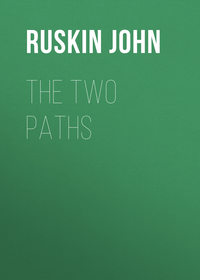
![Stones of Venice [introductions]](/covers_200/34843654.jpg)
